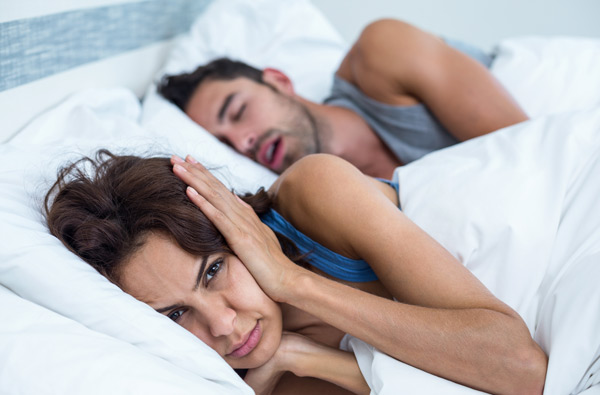Sleep Apnea
Burlington, MA
 Sleep disorders are much more common than you may think. According to the National Sleep Foundation, sleep apnea affects more than 18 million Americans. This figure is, of course, based on reported instances. Many people may not know they suffer from sleep apnea until their symptoms are reported by a sleep partner. This means the real figure could be much higher. If you think you may have sleep apnea, you should seek medical attention as soon as possible, due to the serious nature of the disorder. At Dental Care of Burlington, we offer oral appliances to alleviate the symptoms of sleep apnea. A mouthguard can provide you with safer and more restful sleep! Sleep disorders are much more common than you may think. According to the National Sleep Foundation, sleep apnea affects more than 18 million Americans. This figure is, of course, based on reported instances. Many people may not know they suffer from sleep apnea until their symptoms are reported by a sleep partner. This means the real figure could be much higher. If you think you may have sleep apnea, you should seek medical attention as soon as possible, due to the serious nature of the disorder. At Dental Care of Burlington, we offer oral appliances to alleviate the symptoms of sleep apnea. A mouthguard can provide you with safer and more restful sleep!
What Is Sleep Apnea?
Sleep apnea is characterized by the repeated cessation of breathing during sleep. There are three main types of sleep apnea: obstructive, central, and complex. Obstructive sleep apnea is the most common form caused by the relaxation of the muscles in the throat.
Central sleep apnea occurs when your brain does not send the proper signals to your breathing muscles. Complex sleep apnea is a combination of both obstructive and central sleep apnea. If you have been told you snore loudly, or feel tired even after a full night's sleep, you may have sleep apnea. Other symptoms include:
| • |
Choking or gasping noises during sleep
|
| • |
A sore throat or dry mouth in the morning
|
| • |
Waking up with a dull headache
|
| • |
Trouble staying asleep
|
| • |
Irritability
|
| • |
Trouble paying attention
|
| • |
Excessive daytime sleepiness |
Causes of Obstructive Sleep Apnea
Obstructive sleep apnea occurs when the muscles in the back of your throat relax. When the muscles relax, your airway narrows as you inhale. In some cases, it may even close. This prevents you from getting enough air, which lowers the oxygen level in your blood. When this happens, the brain sends signals that briefly wake you up to reopen your airway. Most of the time, this is too brief to remember. This pattern can repeat multiple times per hour, all night, preventing you from achieving deep, restful sleep.
How Does an Oral Appliance work?
An oral appliance is typically used to treat obstructive sleep apnea. It works by keeping your jaw and tongue in a forward position, which prevents them from blocking your airway, even after the muscles fully relax.
The appliance, similar to a retainer, clamps on to the teeth in your upper and lower jaws. In some cases, the upper and lower portions are connected with a tube that keeps your lower jaw, chin, and tongue in a forward position. With these parts pushed forward, the airway is kept open, allowing you to breathe properly during every stage of sleep.
Oral appliances are considered easier to use than other options, such as CPAP machines. To fabricate your device, we will take an impression of your teeth and gums. This ensures your custom-fit appliance will be precise, comfortable, and effective. It can also protect your teeth from the harmful effects of nocturnal bruxism (teeth grinding).
Schedule Your Consultation Appointment
If you think you may have sleep apnea, we can help! Call 781-362-2260 to schedule your consultation appointment today! |